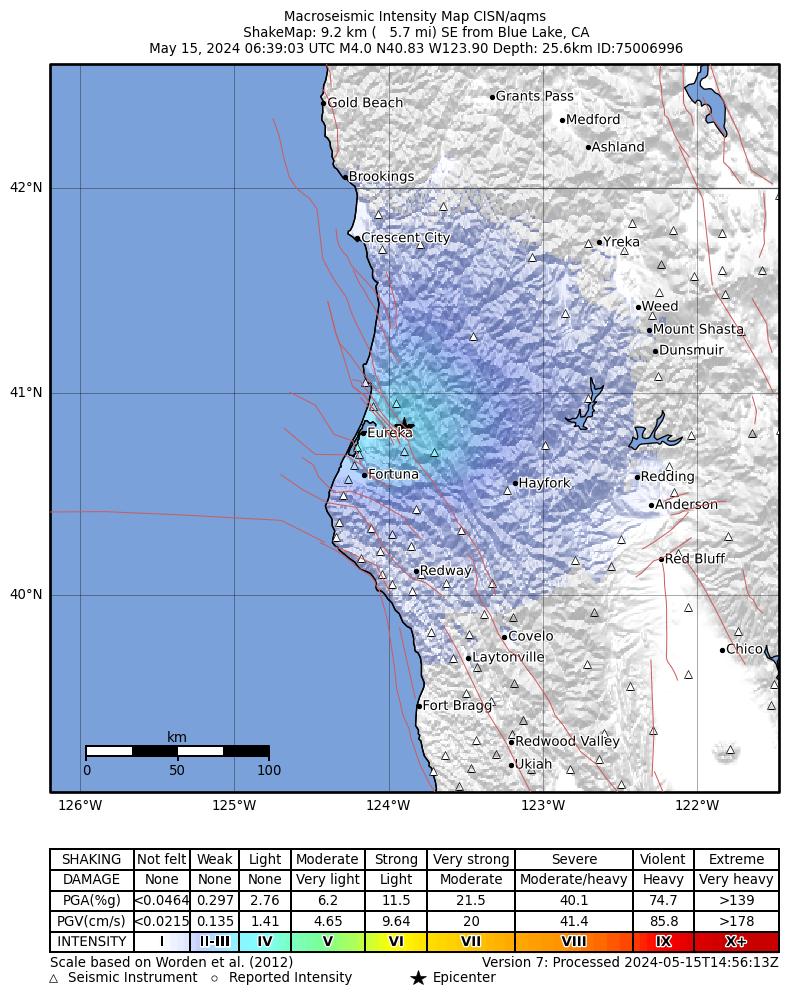Humboldt County residents may have felt some shaking late Tuesday night as a magnitude 4.0 earthquake struck, centered underground close to Blue Lake. An earthquake expert said this quake was relatively deep for the region and came from geologic pulling of a slab — unlike the more frequently felt seismic activity under the ocean.
The ShakeMap of Tuesday night’s quake. Seismic equipment picked it up from Crescent City to Redway. (Courtesy of USGS ShakeMap)
According to the USGS, the epicenter of the quake was about five miles southeast of Blue Lake and began at 11:39 p.m. on Tuesday.
“It’s a good reminder that not all of our earthquakes are off the coast,” said Lori Dengler, emeritus professor of geology at Cal Poly Humboldt and an expert in tsunami and earthquake hazards, reached by phone Wednesday.
Dengler said the depth — which USGS reported at about 16 miles underground — is unique for the area. She said the slab of ocean crust that caused the shake (which surfaces offshore about 35 miles) gently dips to about 12 miles below Willow Creek. Tuesday night’s earthquake is a few miles deeper.
She said the cause of the quake was deformation, pulling of this subduction plate at the Cascadia subduction zone, and on a north-south normal fault which means stretching in an east-west direction.
Reports from the USGS’s community intensity map, which crowdsources how people experience quakes, note people felt it more intensely from Blue Lake outward. Others slept through the quake. Seismic instruments picked up the quake from Redway to Crescent City.
Dengler explained how people feel quakes depends on the quake itself and where they’re at when it strikes. The offshore earthquakes the region regularly experiences are generally less than ten miles deep, she said.
Related Articles
A new use for fiber optic lines: detecting earthquakes, Caltech researchers say
Allstate will insure California homes again, under one condition
California sees two more property insurers exit from market
Earthquake jolts Berkeley, Oakland; epicenter near Claremont Canyon
Rescuers in Taiwan search for family feared trapped in rockslide
“That actually means that we tend to feel them a little more efficiently — the seismic waves are almost coming straight up at us,” she said.
Had the earthquake been nearer to surface it would have been felt more in Blue Lake with less of a spread, the energy dying out faster. The foundation of your house or the geology below can also make the quake feel stronger. Eureka is mostly on sedimentary fill, which tends to amplify the shaking, Dengler said.
Crowdsourced surveys on the intensity of the shake didn’t include reports of damage or items falling off walls. Responses closest to the epicenter are in the light to weak range.
She said there were some similar shakes in history, including a historic earthquake in 1954 at a magnitude 6.5 between Willow Creek and Blue Lake. It caused damage and killed a man in Korbel, according to the Redwood Coast Tsunami Work Group’s website.
“Although usually small in magnitude, the USGS has recorded two similar ‘slab pull’ quakes in the M5 range in the 2000s – a 5.4 near Burnt Ranch in 2008 and a 5.6 NW of Willow Creek on Feb 13, 2012,” she wrote in a text message to the Times-Standard.
The Redwood Coast Tsunami Work Group advises signing up for emergency alerts — The National Weather Service Office in Eureka said on X, formerly Twitter, that because this quake was weak and onshore, there is no risk of a tsunami. Dengler noted that Myshake alert goes off at 4.0 and initial readings were at 3.9, which is why people weren’t alerted on their phones.
Sage Alexander can be reached at 707-441-0504


